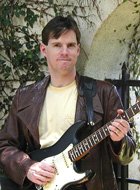
Thursday, April 28, 2011
A Golden Rule of Practice
You learn much faster if you alternate between concepts and let them progress in parallel. It’s best to work on one thing at a time, but don’t wait for the one thing you’re working on now to be perfect before you work on something else.
For example, let's say you are a beginner learning a C major scale in open position for the first time.
-----------------
-------------0-1-
---------0-2-----
---0-2-3---------
-3---------------
-----------------
1. First you refresh your memory of the pattern each day without much concern for technique or timing. Just locate the notes.
2. Then spend a few minutes playing without the metronome, focusing on clean playing technique, damping the open strings so that only one note at a time is heard. It's ok if during this, you have to stop to remember where the notes are.
3. Then switch to building rhythmic accuracy and picking technique by playing a little bit faster with the metronome. It’s ok if during this last part, a few open strings ring out now and then.
The idea that one thing does not have to be perfect before you can study anything else applies to everything you can practice.
Another quick example: don't wait until you can play one song perfectly before starting to work on another one. If you did that, then after a year you'd only know one song, and that song would actually not sound as good as if you'd worked on 10 songs in the same time period.
Thursday, April 14, 2011
What Will I Get out of the Guitar Fretboard Workbook?
Hi Bob,
This book helps you with everything musical that you can do on the guitar. It will be an obvious difference when you apply it for awhile, but I can't say if you'll notice the difference halfway through it. There's not much that it doesn't help, even in the simplest scenario.
Let's say all you ever do is learn songs from magazine tablature. At first that is a process of rote memorization. You read and memorize each finger position one at a time. It's like memorizing song lyrics in a foreign language without knowing what they mean. You can do it, but it's easier to remember and recite convincingly if you actually know what you're saying. But if you know your scales, arpeggios, and chords the way GFW teaches them, then you will identify these things in the music and understand and therefore better remember and execute it.
That's just the beginning. Knowing the fretboard will help you with soloing, composing, transcribing, arranging, reading, etc.
Barrett
Barrett Tagliarino
